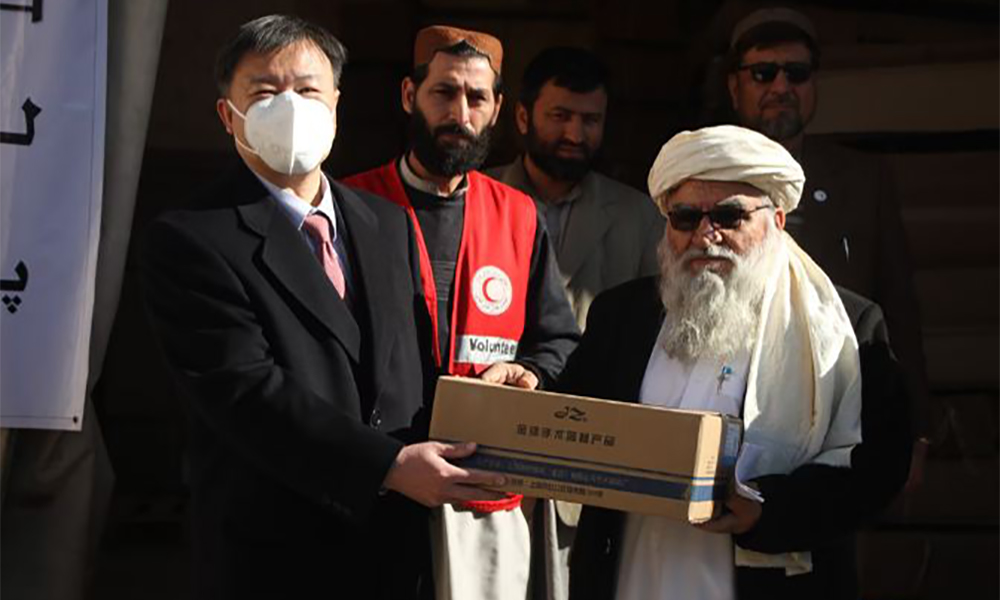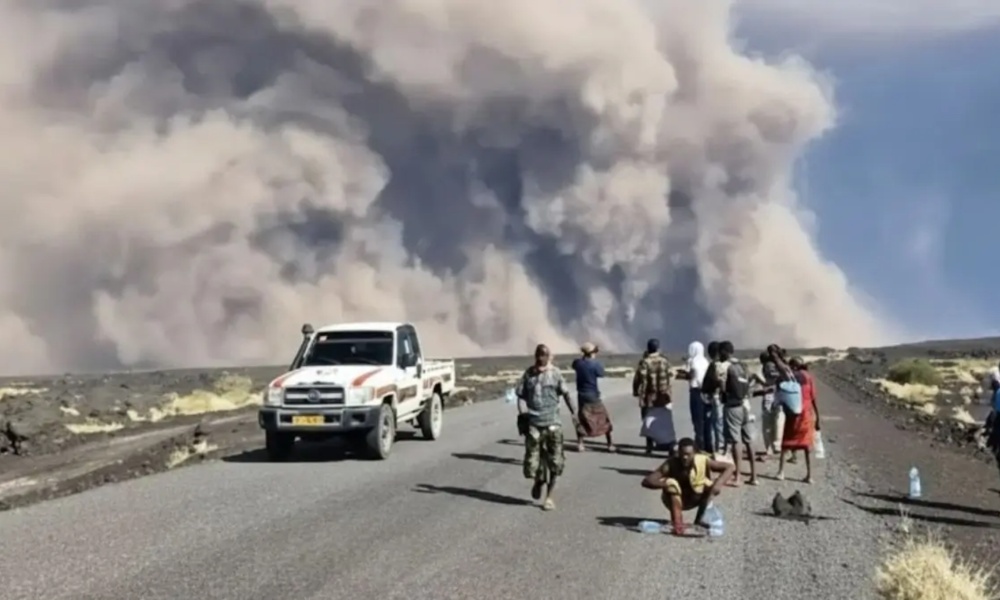Science & Technology
Head of Afghan Red Crescent Society on Facebook censorship list

Facebook recently added the head of one of Afghanistan’s most important domestic aid groups to its Dangerous Individuals terror blacklist, The Intercept news organization reported.
The news organization reported that Matiul Haq Khalis — head of the Afghan Red Crescent Society, or ARCS and a former Islamic Emirate of Afghanistan (IEA) negotiator — was added to the company’s censorship list in late April, joining a group of thousands of people and organizations deemed too dangerous to freely discuss or use the platform, including alleged terrorists, hate groups, drug cartels, and mass murderers.
But Facebook’s designation now means that the list, ostensibly created and enforced to stop offline harm, could disrupt the work of a globally recognized organization working to ease the immiseration of tens of millions of civilians, The Intercept reported.
After the collapse of the U.S.-backed government and withdrawal of American military forces, Khalis was named president of the organization, which helps provide health care, food, and other humanitarian aid to civilians there since its founding in 1934.
Following Khalis’s addition to the Dangerous Individuals list under its most restrictive “Tier 1” category for terrorists due to his IEA affiliation, the over two billion Facebook and Instagram users around the world are now barred from praising, supporting, or representing Khalis.
This means even a photo of him at an official ARCS event, quotation of remarks, or positive mention of him in the context of the organization’s aid work would risk deletion, as would any attempt on his part to use the company’s platform to communicate, either in Afghanistan or abroad.
John Sifton, Asia advocacy director at Human Rights Watch questioned the extent to which letting people speak freely of Khalis would endanger anyone or anything. “How is he ‘dangerous’? He’s like 65 years old. He has no militia. His father was a mujahedeen commander, but what is the problem here?”
Sifton pointed to groups that are actively using the platform to incite violence. “There are hate guys in India that are spreading toxic anti-Muslim violence across Facebook, Hindu nationalist groups, hateful Buddhist groups in Burma, that’s a real problem. Having Khalis online posting about how he cut the ribbon at a new hospital in Afghanistan, that’s not part of the problem.”
Facebook has at times defended the breadth of its blacklist by claiming, without evidence, that it’s legally required to censor discussion of certain entities in order to comply with U.S. sanctions law, though neither the ARCS nor Khalis are currently named in the Treasury or State Department’s counterterrorism sanctions lists, The Intercept reported.
Science & Technology
Australia social media ban set to take effect, sparking a global crackdown
For the social media businesses, the implementation marks a new era of structural stagnation as user numbers flatline and time spent on platforms shrinks, studies show.

Australia is set to become the first country to implement a minimum age for social media use on Wednesday, with platforms like Instagram, TikTok and YouTube forced to block more than a million accounts, marking the beginning of an expected global wave of regulation.
From midnight, 10 of the biggest platforms will be required to block Australians aged under 16 or be fined up to A$49.5 million ($33 million), Reuters reported.
The law received harsh criticism from major technology companies and free speech advocates, but was praised by parents and child advocates.
The rollout closes out a year of speculation about whether a country can block children from using technology that is built into modern life. And it begins a live experiment that will be studied globally by lawmakers who want to intervene directly because they are frustrated by what they say is a tech industry that has been too slow to implement effective harm-minimisation efforts.
Governments from Denmark to Malaysia – and even some states in the U.S., where platforms are rolling back trust and safety features – say they plan similar steps, four years after a leak of internal Meta (META.O) documents showed the company knew its products contributed to body image problems and suicidal thoughts among teenagers while publicly denying the link existed.
“While Australia is the first to adopt such restrictions, it is unlikely to be the last,” said Tama Leaver, a professor of internet studies at Curtin University.
“Governments around the world are watching how the power of Big Tech was successfully taken on. The social media ban in Australia … is very much the canary in the coal mine.”
A spokesperson for the British government, which in July began forcing websites hosting pornographic content to block under-18 users, said it was “closely monitoring Australia’s approach to age restrictions.”
“When it comes to children’s safety, nothing is off the table,” they added.
Few will scrutinise the impact as closely as the Australians. The eSafety Commissioner, an Australian regulator tasked with enforcing the ban, hired Stanford University and 11 academics to analyse data on thousands of young Australians covered by the ban for at least two years.
Though the ban covers 10 platforms initially, including Alphabet’s (GOOGL.O), YouTube, Meta’s Instagram and TikTok, the government has said the list will change as new products appear and young users switch to alternatives.
Of the initial 10, all but Elon Musk’s X have said they will comply using age inference – guessing a person’s age from their online activity – or age estimation, which is usually based on a selfie. They might also check with uploaded identification documents or linked bank account details.
Musk has said the ban “seems like a backdoor way to control access to the internet by all Australians” and most platforms have complained that it violates people’s right to free speech.
For the social media businesses, the implementation marks a new era of structural stagnation as user numbers flatline and time spent on platforms shrinks, studies show.
Platforms say they don’t make much money showing advertisements to under-16s, but they add that the ban interrupts a pipeline of future users. Just before the ban took effect, 86% of Australians aged 8 to 15 used social media, the government said.
“The days of social media being seen as a platform for unbridled self-expression, I think, are coming to an end,” said Terry Flew, the co-director of University of Sydney’s Centre for AI, Trust and Governance.
Platforms responded to negative headlines and regulatory threats with measures like a minimum age of 13 and extra privacy features for teenagers, but “if that had been the structure of social media in the boom period, I don’t think we’d be having this debate,” he added.
Science & Technology
Ethiopian volcano erupts for first time in nearly 12,000 years
Ash from the eruption drifted across the region, spreading over Yemen, Oman, India, and parts of Pakistan.

The Hayli Gubbi volcano in Ethiopia’s Afar region has erupted for the first time in almost 12,000 years, sending massive ash plumes soaring up to 14 kilometres into the atmosphere, according to the Toulouse Volcanic Ash Advisory Centre.
The eruption began on Sunday and lasted several hours. Hayli Gubbi, located around 800 kilometres northeast of Addis Ababa near the Eritrean border, sits within the geologically active Rift Valley, where two major tectonic plates meet. The volcano rises roughly 500 metres above the surrounding landscape.
Ash from the eruption drifted across the region, spreading over Yemen, Oman, India, and parts of Pakistan. Satellite imagery and social-media videos captured a towering column of white smoke billowing into the sky.
The Smithsonian Institution’s Global Volcanism Program notes that Hayli Gubbi has no recorded eruptions during the Holocene, the period dating back about 12,000 years to the end of the last Ice Age.
Volcanologist Simon Carn of Michigan Technological University also confirmed on Bluesky that the volcano had “no record of Holocene eruptions.”
Science & Technology
Cloudflare outage easing after millions of internet users affected

A global outage at web-infrastructure firm Cloudflare began to ease on Tuesday afternoon after preventing people from accessing major internet platforms, including X and ChatGPT.
Cloudflare, whose network handles around a fifth of web traffic, said it started to investigate the internal service degradation around 6:40 a.m. ET. It has deployed a fix but some customers might still be impacted as it recovers service.
The incident marked the latest hit to major online services. An outage of Amazon’s cloud service last month caused global turmoil as thousands of popular websites and apps, including Snapchat, were inaccessible due to the disruption.
Cloudflare – whose shares were down about 5% in premarket trading – runs one of the world’s largest networks that helps websites and apps load faster and stay online by protecting them from traffic surges and cyberattacks.
The latest outage prevented users from accessing platforms such as Canva, X, and ChatGPT, prompting users to log outage reports with Downdetector.
Downdetector tracks outages by collating status reports from a number of sources. “We saw a spike in unusual traffic to one of Cloudflare’s services beginning at 11:20 UTC. That caused some traffic passing through Cloudflare’s network to experience errors,” the company said in an emailed statement.
“We are all hands on deck to make sure all traffic is served without errors.”
X and ChatGPT-creator OpenAI did not immediately respond to requests for comment. – REUTERS
-

 Latest News3 days ago
Latest News3 days agoAfghan border forces prevent illegal entry of hundreds into Iran
-

 Latest News3 days ago
Latest News3 days agoPakistan summons Afghan diplomat over deadly attack in North Waziristan
-

 Latest News2 days ago
Latest News2 days agoAfghan health minister calls for medical cooperation between Kabul and New Delhi
-

 Latest News1 day ago
Latest News1 day agoAfghanistan signs 30-year deal for marble mining in Daikundi
-

 Latest News3 days ago
Latest News3 days agoJapan allocates nearly $20 million in humanitarian aid for Afghanistan
-

 Latest News2 days ago
Latest News2 days agoKarzai urges reopening of girls’ schools and universities for Afghanistan’s bright future
-

 Health5 days ago
Health5 days agoAfghanistan seeks India’s support in standardizing traditional medicine
-

 World5 days ago
World5 days agoUS readies new Russia sanctions if Putin rejects peace deal, Bloomberg News reports
























